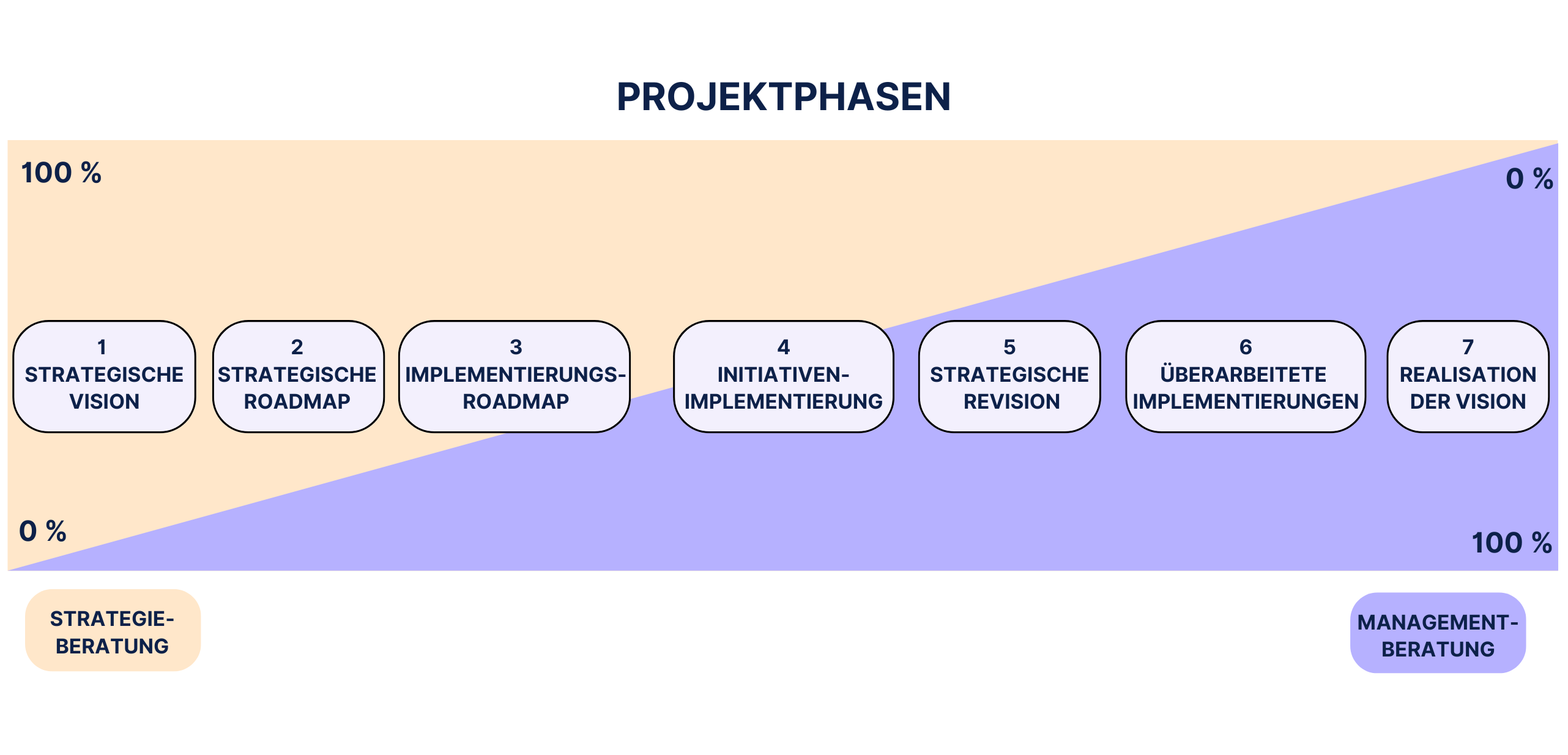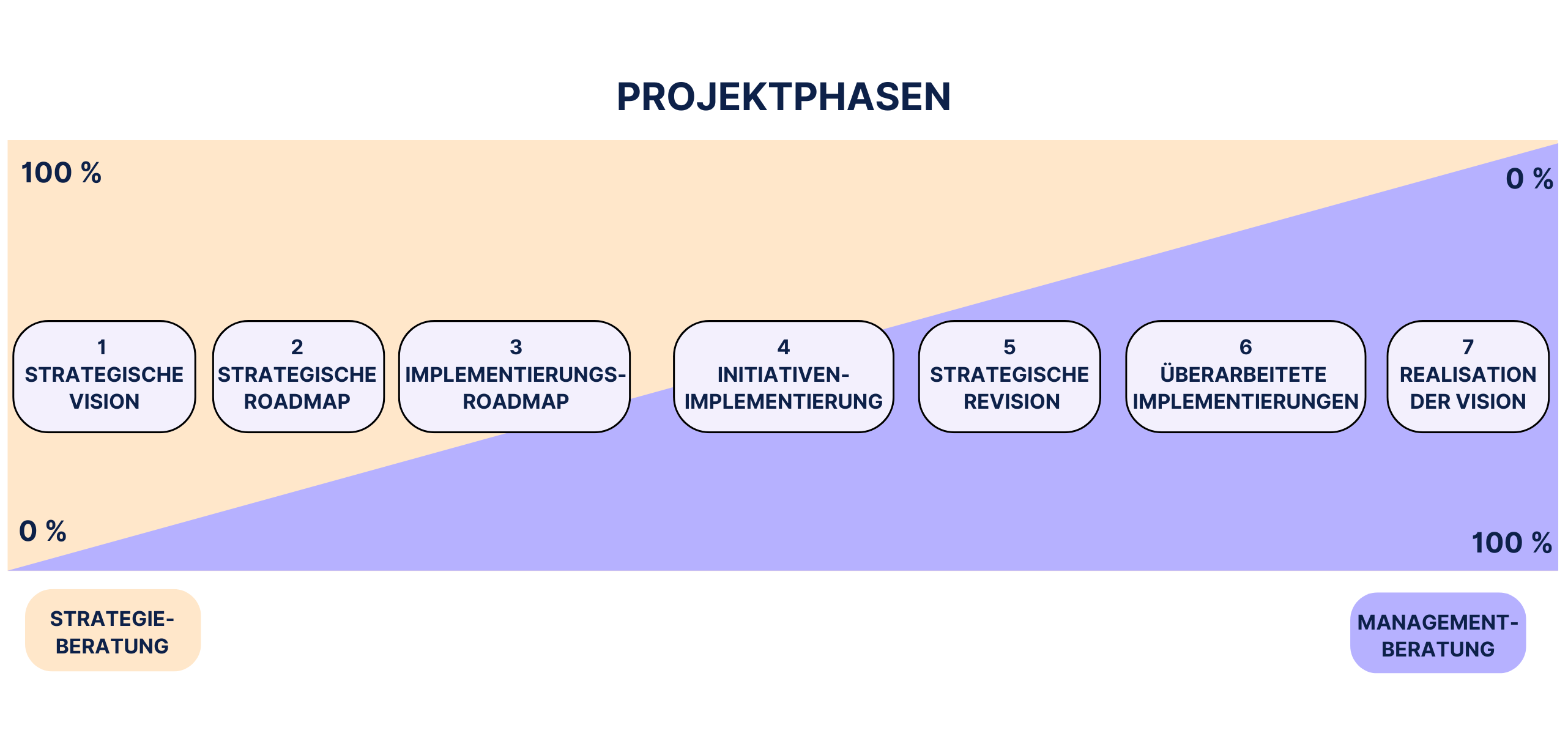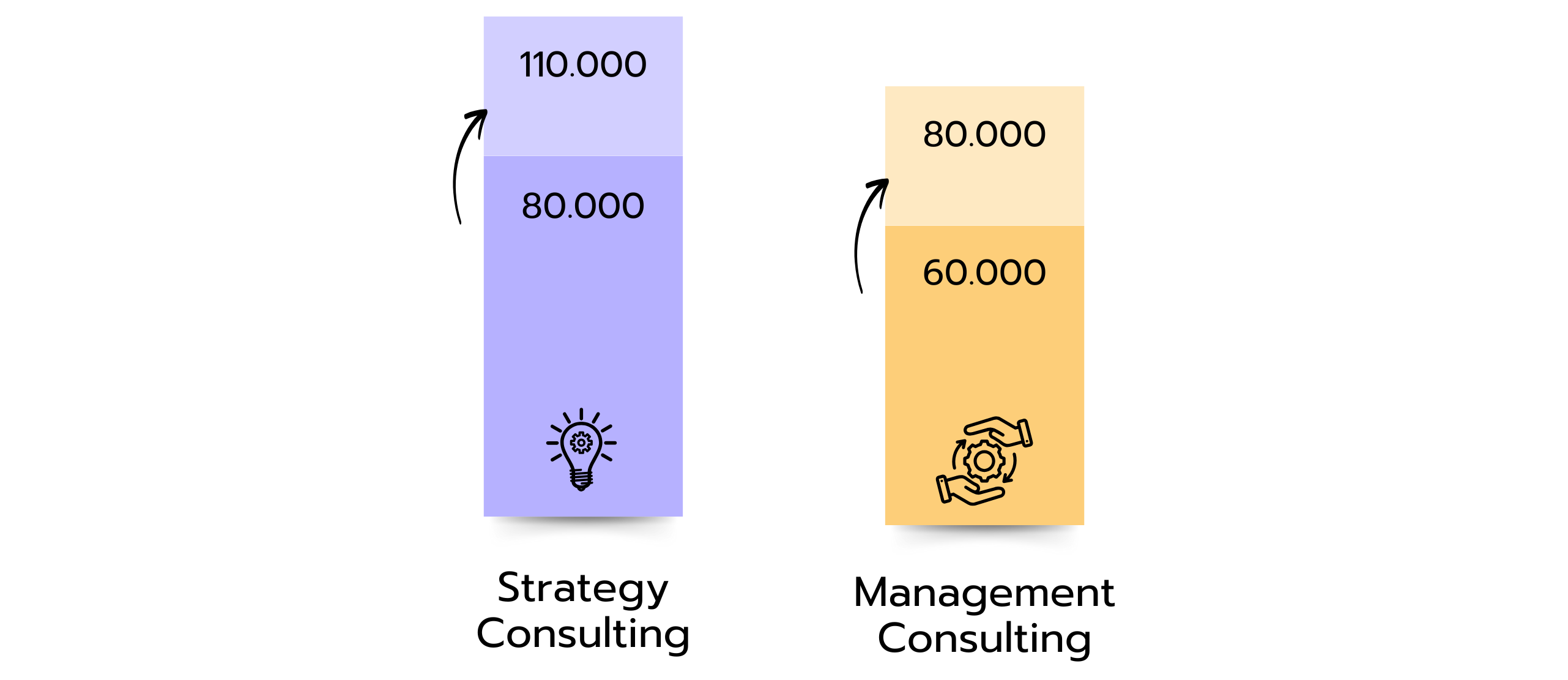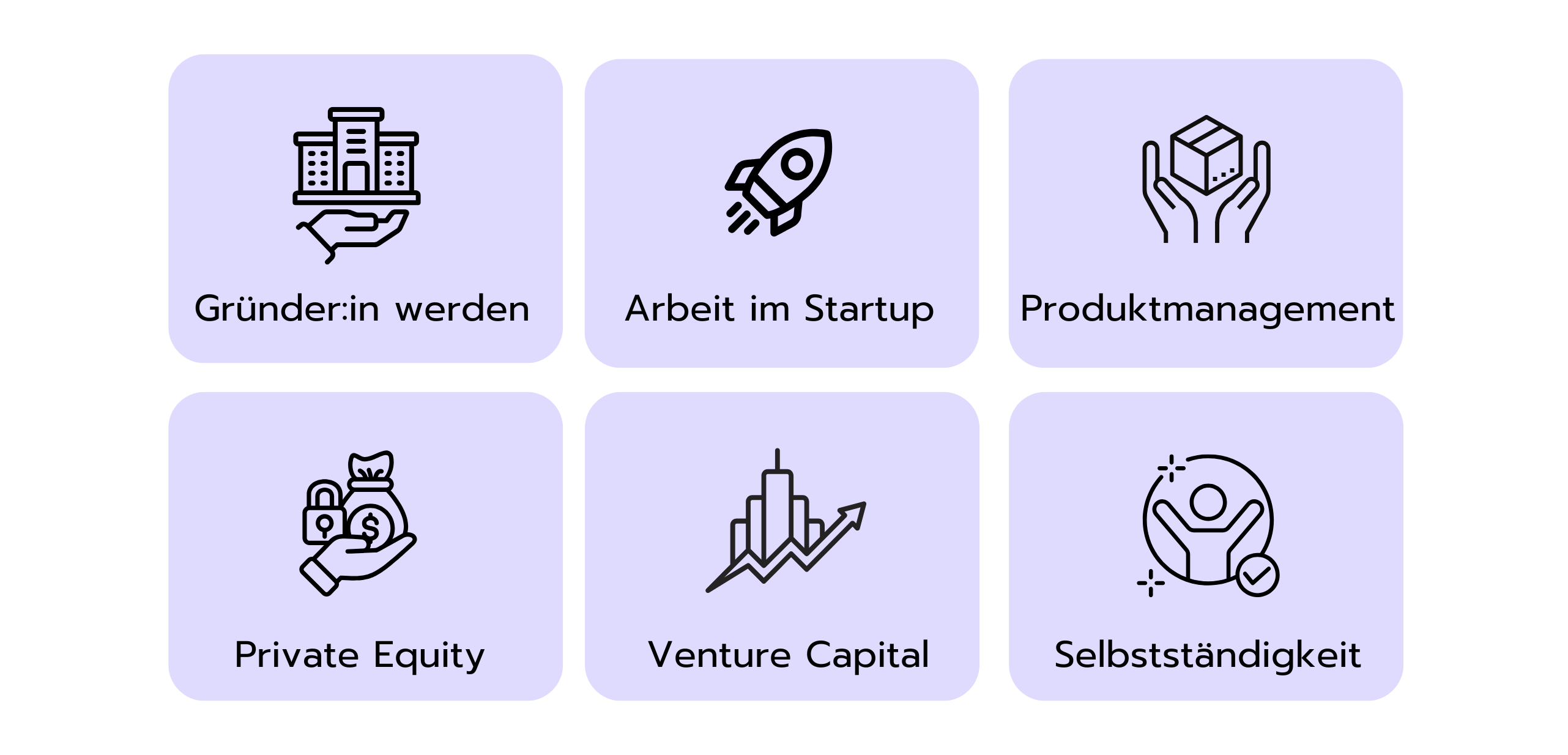Strategieberatung definiert das „Was“ – langfristige Richtung, Marktentscheidungen, Prioritäten.
Managementberatung verantwortet das „Wie“ – Umsetzung in Prozesse, Strukturen und messbare Ergebnisse.
Die Beratungs-Branche ist unglaublich vielfältig, mit vielen Nischen und spezialisierten Sektoren. Beratungsdienstleistungen können in der Geschäftswelt jede Einheit des Geschäftsbetriebs abdecken, z.B. von Steuer bis Logistik.
Es kann verwirrend sein, die Unterschiede zwischen den verschiedenen Arten von Beratungsunternehmen zu verstehen. Vor allem Management- und Strategieberatung werden oft verwechselt. Es gibt jedoch einige wesentliche Unterschiede in Bezug auf die von ihnen übernommenen Projekte, ihre Arbeitszeiten und Gehälter.
In einfachen Worten geht es bei der Strategieberatung um das „Was“ und bei der Managementberatung um das „Wie“. Strategieberater:innen konzentrieren sich auf die großen Fragen und die strategische Vision eines Unternehmens, während Managementberater:innen sich auf die Ausführung auf operativer Ebene konzentrieren. Trotzdem sind sie miteinander verbunden und hängen oft voneinander ab.
Im Allgemeinen bezahlen Unternehmen Berater:innen für die Durchführung von Projekten, die sie mit ihren internen Fähigkeiten oder Kapazitäten nicht bewältigen können. Bei diesen Projekten geht es in der Regel um Veränderungsprozesse im Unternehmen, wie z.B. die Implementierung von Technologien, organisatorische Umstrukturierungen, digitale Transformation usw. Die Zusammenarbeit mit Beratungen verschafft ihnen Zugang zu spezialisiertem Wissen und effizienten, flexiblen Ressourcen, um ihre Ziele zu erreichen.
Dieser Artikel unseres Experten Agrim führt dich in die Management- und Strategieberatung ein und erörtert die Unterschiede zwischen den beiden Beratungsarten.
Unternehmen beauftragen Beratungen aus verschiedenen Gründen, unter anderem:

🧠 Fachwissen: Berater:innen bringen spezielle Kenntnisse und Fähigkeiten mit, die im Unternehmen möglicherweise nicht vorhanden sind. Sie können fachkundigen Rat zu einer Reihe von Themen geben, von der Geschäftsstrategie bis zu technischen Lösungen.
🔎 Objektivität: Berater:innen sind oft in der Lage, eine unvoreingenommene Perspektive auf die Herausforderungen und Möglichkeiten eines Unternehmens zu bieten. Sie können eine Außenperspektive bieten, die für interne Mitarbeiter:innen schwer zu erreichen ist. Berater:innen haben den Vorteil, die Unternehmen aus einer Querschnittsperspektive betrachten zu können. Dadurch sind sie in der Wachstums- und Verbesserungsbereiche zu erkennen, die dem internen Management aufgrund der verschiedenen Hierarchieebenen ansonsten verborgen bleiben würden.
📈 Effizienz: Berater:innen können Projekte oder Aufgaben oft effizienter erledigen als interne Mitarbeiter:innen. Sie sind in der Regel hoch konzentriert und können schnell und effektiv arbeiten.
🤸♀️ Flexibilität: Berater:innen können für bestimmte Projekte oder Zeiträume herangezogen werden, sodass Unternehmen ihre Mitarbeiterzahl je nach Bedarf schnell erhöhen oder verringern können, ohne Vollzeitkräfte einstellen zu müssen.
💸 Kosteneinsparungen: Die Einstellung von Berater:innen kann oft kostengünstiger sein als die Einstellung von Vollzeitkräften mit ähnlichen Fachkenntnissen. Außerdem können Berater:innen dabei helfen, Kosteneinsparungsmöglichkeiten innerhalb eines Unternehmens zu ermitteln.
Ganz einfach gesagt: Strategieberatung ist das Geschäft des Beratens anderer Unternehmen zu strategischen Themen.
Dieser Satz besteht aus vier Teilen.
Schauen wir uns das einmal genauer an:
Am Anfang eines jeden Beratungsprojekts steht die Strategiephase. In dieser Phase arbeiten wir mit den Führungskräften des Unternehmens zusammen, um das strategische Projekt mit dem höchsten Wert zu ermitteln und zu priorisieren, um den Wert für die Aktionär:innen und das Unternehmenswachstum zu maximieren (in der Regel Gewinnspanne oder Umsatz).
Der häufigste Zeitpunkt für die Beauftragung von Strategieberatern ist die Ernennung eines oder einer neuen CEO. Der oder die CEO wird eine strategische Vision für die Amtszeit festlegen wollen, in der Regel einen 5-Jahres-Zeitplan, um ein Unternehmensziel zu erreichen, z. B. eine Umsatzsteigerung von 20 % in den nächsten 5 Jahren. Strategieberater:innen arbeiten dann mit der Führungskraft zusammen, um zu entscheiden, wie diese Ziele unter Berücksichtigung von Wettbewerbern, Marktbedingungen usw. am besten erreicht werden können. Sobald die strategische Richtung festgelegt ist, obliegt es dem Unternehmen und gegebenenfalls den Unternehmensberatern, die Strategie umzusetzen.
Die Strategieberatung erfordert eine ausgeprägte Fähigkeit zur Problemlösung und zum Rechnen sowie ein unkonventionelles Denken und eine hohe Anpassungsfähigkeit. Hervorragende soziale Kompetenz, Zeitmanagement und Organisation sind ebenfalls Fähigkeiten, die von Top-Strategieberatern verlangt werden, damit sie schnell mit verschiedenen Interessengruppen innerhalb eines Unternehmens in Kontakt treten können, um die Informationen zu erhalten, die sie für fundierte Entscheidungen benötigen.
Das oberste Ziel der Strategieberatung besteht darin, den Kund:innen einen klaren Weg zu mehr Marktanteilen und einem Wettbewerbsvorteil in ihrer Branche zu weisen.
Einige Beispiele für Projekte, mit denen Strategieberater:innen betraut werden kann, sind:
Ich werde eine kurze Liste von Beispielprojekten aus meiner eigenen Erfahrung anführen - vielleicht kannst du dadurch ein gutes Verständnis entwickeln:
Managementberater:innen analysieren die Struktur, den Betrieb und die Strategien eines Unternehmens, um Verbesserungsmöglichkeiten aufzuzeigen, oder sie werden mit der Lösung spezifischer und dringender Probleme beauftragt. Ihr Ziel ist es nicht nur, Probleme zu identifizieren, sondern auch Lösungen zu empfehlen und manchmal in weiteren Projekten umzusetzen. Durch die Beseitigung von Schwachstellen und die Nutzung ihres Geschäftssinns wollen die Berater:innen positive Veränderungen bewirken und die Geschäftsergebnisse optimieren.
Im Mittelpunkt der Unternehmensberatung steht das Wort „Management“. Berater:innen befassen sich mit hochrangigen Geschäftsfragen, die CEOs, Vorsitzende und Vorstände betreffen. Ihre Aufgabe besteht darin, das Management in bestimmten Bereichen zu übernehmen, um Organisationen bei der Bewältigung von Herausforderungen, der Wertsteigerung und der Förderung von Wachstum zu unterstützen. Sie bringen neue, externe Perspektiven, erprobte Strategien und innovative Ideen ein, um die allgemeine Unternehmensleistung zu verbessern.
Die Managementberatung umfasst verschiedene Spezialgebiete, die auf die spezifischen Bedürfnisse von Unternehmen zugeschnitten sind. Wenn ein Unternehmen beispielsweise mit finanziellen Problemen konfrontiert ist, kann es sich an eine Managementberatung für Finanzmanagement wenden. Diese Berater:innen sind keine “One-Size-Fits-All-Lösung”, sondern konzentrieren sich auf bestimmte Fachgebiete innerhalb eines Unternehmens.
Managementberater:innen konzentrieren sich auf die Umsetzung von Veränderungen in einem Unternehmen. Dabei kann es sich um die Verbesserung bestehender Abläufe oder die Umsetzung strategischer Veränderungen handeln (denen in der Regel eine Strategie vorausgeht).
Ein typisches Managementberatungs-Projekt umfasst die folgenden Schritte:
Die Schritte 1-6 können sowohl von Strategie- als auch von Managementberater:innen durchgeführt werden. Das Fachwissen von Managementberater:innen liegt jedoch in der Regel eher in der Umsetzung, wie in Schritt 7 dargelegt.
Einige Beispiele für Projekte, mit denen ein Managementberatungen betraut werden können, sind:
Managementberatungen können sich auf verschiedene Geschäftsbereiche spezialisieren und verfügen so über ein tiefes Verständnis ihrer jeweiligen Arbeitsbereiche. So sind die Berater:innen von IBM beispielsweise auf Cloud-Lösungen spezialisiert, und Beratungen wie Accenture und die „Big Four“ bieten Leistungen in den Bereichen Risiko, Steuern, Personal und Technologie an, wobei jeder Praxisbereich nur Projekte in seinem jeweiligen Bereich durchführt. Wie bei der Strategieberatung sind auch hier quantitative und problemlösende Fähigkeiten gefragt. Für Managementberater:innen sind jedoch ausgezeichnete kommunikative und zwischenmenschliche Fähigkeiten noch wichtiger, da sie in der Regel Seite an Seite mit Mitarbeitenden des Klienten an schwierigen Themen wie Prozessänderungen arbeiten.
Einige der größten Managementberatungen sind IBM, Accenture und die „Big Four“ (Deloitte, EY, PwC und KPMG). Diese Unternehmen bieten wettbewerbsfähige Preise und qualitativ hochwertige Dienstleistungen an, indem sie innovative und nachhaltige Lösungen für ihre Kunden in einer Vielzahl von Branchen umsetzen.
👉 Erfahre hier, was Berater:innen bei Deloitte, PwC, KPMG und EY machen.
Jobs in allen Sektoren von Unternehmensberatungen sind sehr begehrt und gefragt. Das hat mehrere Gründe:

Unternehmensberatungen bieten einige der höchsten Gehaltspakete auf dem Markt. Mit Grundgehältern nach dem MBA von rund 150.000 Dollar ist dies sicherlich eine attraktive Option für viele Menschen. Die Boni liegen zwischen 20 % und 60 % des Grundgehalts, je nach Unternehmen, Karrierestufe und Leistung.
Neben der attraktiven Vergütung kommst du in den Genuss einiger Annehmlichkeiten und Vergünstigungen wie Hotelübernachtungen, Freiflüge, kostenlose Taxifahrten, kostenloses Essen, alle damit verbundenen Meilen und Punkte sowie Netzwerkmöglichkeiten in spannenden Branchen.
Strategie- und Managementberatung zieht die klügsten Köpfe aus der Masse an. Man arbeitet mit Gleichgesinnten zusammen und jeder hilft dem anderen, an die Grenzen zu gehen. Dein berufliches und intellektuelles Wachstum wird in der Beratung viel schneller und besser sein als in anderen Berufen.
Beratungsunternehmen legen großen Wert auf Lernen und Entwicklung. Die meisten von ihnen führen halbjährliche Beurteilungs- und Bewertungszyklen durch, in denen sie deine Entwicklungsbereiche ermitteln, an denen du dann arbeiten kannst. Beratungsunternehmen bilden dich auch für die nächste Stufe aus, wenn deine Beförderung ansteht.
In der Beratung hat man es mit CXOs, Minister:innen und hochrangigen Entscheidungsträger:innen zu tun. Wenn man solche Leute berät, steht man ständig unter Druck. Wenn man mit ihnen spricht, lernt man auch enorm viel. Zu verstehen, wie diese Menschen denken, ist eine der besten Lehren, die ich aus meiner Erfahrung bei BCG gezogen habe.
Strategie- und Managementberatung haben auch einen der schnellsten Beförderungszyklen auf dem Markt. In der Regel wird man alle 2-3 Jahre auf die nächste Ebene befördert. Bei Beratungsunternehmen wie MBB gilt außerdem das Prinzip „up or out“. Wenn du innerhalb des vorgegebenen Zeitraums nicht befördert werden kannst, solltest du besser woanders dein Glück suchen. Tier-1-Beratungsunternehmen haben jedoch spezielle Abteilungen, die dir helfen, deinen nächsten Job zu finden. Der Gedanke dabei ist NICHT, dass du nicht gut bist, sondern dass du für eine andere Stelle besser geeignet bist.
Strategieberatung und Managementberatung sind beides Arten von Unternehmensberatungen, die sich jedoch auf unterschiedliche Bereiche der Geschäftstätigkeit eines Unternehmens konzentrieren. Zwar gibt es gewisse Überschneidungen zwischen den beiden Beratungsarten, doch konzentriert sich die Strategieberatung eher auf die langfristige Planung und das Denken in großen Zusammenhängen, während die Managementberatung eher auf die Durchführung spezifischer Projekte und Initiativen ausgerichtet ist.
Strategieberater:innen helfen einem Unternehmen bei der Festlegung der allgemeinen Geschäftsstrategie, einschließlich der Ziele, Ausrichtung und Vorgehensweise im Wettbewerb. Sie arbeiten in der Regel mit leitenden Angestellten zusammen, um bei der Entwicklung und Verfeinerung ihrer strategischen Vision zu helfen, Wachstumschancen zu identifizieren und Entscheidungen über größere Investitionen, Partnerschaften oder Übernahmen zu treffen.
Managementberater:innen hingegen konzentrieren sich darauf, Unternehmen bei der Verbesserung alltäglicher Abläufe und Managementpraktiken zu unterstützen. Sie arbeiten mit einer Vielzahl von Teams und Abteilungen innerhalb eines Unternehmens zusammen, um ihnen zu helfen, Prozesse zu optimieren, Kosten zu senken und die Leistung zu verbessern. Dies kann alles umfassen, von der Verbesserung des Lieferkettenmanagements über die Rationalisierung von Personalprozessen bis hin zur Optimierung der IT-Infrastruktur.
Typischerweise umfasst die Managementberatung die Umsetzungsphase und ist daher zeitaufwändiger und umfangreicher, während Strategieberatungs-Projekte eher sporadisch und intensiv sind und einen engen Zeitplan haben.


Da Strategie- und Managementberatung eng miteinander verknüpft sind, gibt es im Projekt häufig eine Übergabe von der Strategie zum Management. Dies kann zu Schwierigkeiten und Herausforderungen bei der Umsetzung führen. Um dies zu überwinden, haben Firmen wie PwC Strategieunternehmen aufgekauft, um eine End-to-End-Beratungslösung von der Strategie bis zur Umsetzung anbieten zu können. Ein anderes Beispiel ist McKinsey: Hier wurde eine eigene Implementierungseinheit namens McKinsey Implementation gegründet.
Allgemein bekannt sind die Arbeitszeiten in der Unternehmensberatung berüchtigt. Je nach Art des laufenden Projekts können sie pro Tag stark variieren.
Ziel von Strategieberater:innen ist es, das Fachwissen und die Ressourcen bereitzustellen, die zur Lösung von Geschäftsproblemen wie den oben genannten erforderlich sind. Die Art dieser Projekte kann aufgrund strikter Fristen oft kurz, aber von hoher Intensität sein, was zu längeren Arbeitszeiten für die Dauer des Projekts führen kann.
Im Gegensatz dazu werden Managementberater:innen häufig für längerfristige Projekte eingesetzt, die die Umsetzung neuer Strategien für Klienten beinhalten und sechs Monate bis über ein Jahr dauern können, da die Berater:innen eng mit ihren Kunden zusammenarbeiten, um eine reibungslose Übergangsphase während der Lösungsumsetzung zu gewährleisten.
Es ist jedoch zu beachten, dass die Arbeitszeiten sowohl bei der Strategie- als auch bei der Managementberatung variabel sind und sich je nach Art und Komplexität des Projekts ändern können. Diese Zeiten können zwar eine durchschnittliche Schätzung darstellen, sind aber keine exakte Antwort. Darüber hinaus können sich viele andere Faktoren auf die Arbeitszeiten in der Beratung auswirken, wie z. B. der Standort, die Anforderungen des Kunden, die Reiseanforderungen und die Erwartungen des Unternehmens.
Im Allgemeinen bieten Strategieberatungsunternehmen höhere Einstiegsgehälter als Managementberatungsfirmen. Das liegt daran, dass Strategieberatung mehr Spezialwissen und Fachkenntnisse erfordert und die Arbeit in der Regel anspruchsvoller und strategischer ist. Außerdem verlangen Strategieberater:innen höhere Preise für ihre Arbeit, was sich auch in den Gehältern niederschlägt. Denk aber daran, dass sich innerhalb derselben Beratungsfirma die Gehälter intern nicht unterscheiden, wenn beide Bereiche - also Management- und Strategieberatung - abgedeckt werden.
Eine Analyse von 60 der weltweit führenden Beratungsunternehmen zeigt, dass Strategieberater:innen im Durchschnitt 23 % mehr verdienen als Managementberater:innen. Dies ist auf eine Kombination aus längeren Arbeitszeiten und auch auf die Komplexität der Arbeit zurückzuführen, die höhere Preise nach sich zieht.
Branchenangaben zufolge können Berufseinsteiger:innen bei erstklassigen Strategieberatungsunternehmen mit einem Einstiegsgehalt zwischen 80 000 und 110 000 Dollar pro Jahr rechnen, während Einsteiger:innen bei Managementberatungsfirmen mit einem Einstiegsgehalt zwischen 60 000 und 80 000 Dollar pro Jahr rechnen können.
Der Gehaltsunterschied ist selbst bei Unternehmen, die sowohl Strategie- als auch Managementberatung anbieten, deutlich. Da sich die Gehälter an den Marktpreisen orientieren, ist es wahrscheinlich, dass Absolvent:innen einer Unternehmensberatung in ein und demselben Unternehmen unterschiedliche Einstiegsgehälter erhalten.

Es ist wichtig zu beachten, dass es sich hierbei um allgemeine Spannen handelt und dass die Gehälter je nach Unternehmen, Standort und anderen Faktoren stark variieren können. Darüber hinaus bieten Beratungsunternehmen oft weitere Vorteile und Vergünstigungen wie Signing-Bonus, Leistungsprämien und Aufstiegsmöglichkeiten, die sich auf das Gesamtvergütungspaket auswirken können.
👉 Erfahren mehr über Gehälter im Consulting in unserem Blogartikel.
Wirf auch einen Blick auf unsere Artikel über Consulting Gehälter in bestimmten Märkten, um herauszufinden, was du in der spezifischen Region verdienen kannst.
👉 Consulting-Gehälter in Deutschland, Österreich und der Schweiz
👉 Consulting-Gehälter in den USA
👉 Consulting-Gehälter im Vereinigten Königreich
👉 Consulting-Gehälter in Frankreich
👉 Consulting Gehälter in Singapur
👉 Consulting Gehälter in Kanada
Die Einstiegsgehälter in der Management- und Strategieberatung können je nach Beratungsunternehmen, Standort sowie Qualifikation und Erfahrung von Bewerber:innen variieren.
Die Tätigkeit als Management- oder Strategieberater:innen bringt viele Vorteile mit sich, ist jedoch nicht ohne Herausforderungen. Werfen wir einen Blick auf einige von ihnen:
Es ist bekannt, dass die Vereinbarkeit von Berufs- und Privatleben in der Unternehmensberatung eine große Herausforderung darstellt. Lange Arbeitszeiten, unvorhersehbare Zeitpläne, Eile in letzter Minute, Wochenendarbeit. Doch so schlimm muss es nicht sein. Es ist ein Schiff, das mit minimalem Schaden navigiert werden kann, wenn es gut gemanagt wird. Ein Beratungsjob ohne persönliche Kompromisse ist schwer zu finden. Sieh es als einen aktiven Prozess, auf den du bis zu einem gewissen Grad Einfluss haben kannst. Beratung ist ein Marathonberuf, kein Sprintberuf. Gute Manager:innen und Partner:innen sorgen immer dafür, dass die Stimme des Teams gehört wird. Wenn du deinen Grundsätzen treu bleibst, wirst du nach und nach Menschen mit ähnlichen Prioritäten treffen.
Hoher zeitlicher Druck ist ebenso eine Herausforderung für Berater:innen. Von dir wird erwartet, dass du bestimmte Ergebnisse in einem bestimmten Zeitrahmen erzielen kannst, was ein gewisses Maß an Leistung verlangt. Da dies sehr deutlich kommuniziert wird, solltest du dich auf die Erwartungen einstellen. Achte dennoch auf deine geistige und körperliche Gesundheit. Es gibt Möglichkeiten, beides in Angriff zu nehmen. Und ich bin gerne bereit, Tipps mit allen zu teilen, die daran interessiert sind. Die Idee ist, sich nicht zu viel zu Herzen zu nehmen und immer die Prioritäten deines Lebens zu äußern.
Strategie- und Managementberater:innen sehen sich häufig den unterschiedlichsten Kritiken von verschiedenen Seiten ausgesetzt. Die beiden zentralen sind die folgenden:
Für Berater:innen in der Strategie- oder Managementberatung, die beschließen, die Branche zu verlassen, den Exit zu wagen und ihre Erfahrungen in anderen Bereichen zu nutzen, kann es verwirrend sein, den nächsten Schritt zu bestimmen. Da fast alles in ihrer Reichweite liegt, kann es schwierig sein, die beste Gelegenheit zu ergreifen. Die Möglichkeiten, die sich dir bieten, sind endlos. Ich werde einige der Exitmöglichkeiten auflisten, die die Menschen in meinem Netzwerk bisher gegangen sind:

Manche haben ihre eigenen Unternehmen gegründet - von einer Podcast-Agentur, einem Yoga-Youtube-Kanal, einem B2B-E-Commerce-Marktplatz, einer Merchandising-Firma, einer Gesundheits-Tracking-App, einem Fantasy-Liga-Unternehmen ... und so weiter.
Sie könnten in jedem aufstrebenden Start-up eine Stelle finden. Berater:innen gelten im Vergleich zu Bewerber:innen aus anderen Bereichen als besonders leistungsstark und sind daher ideal für Start-ups geeignet.
Produktmanagementpositionen in Technologieunternehmen werden beispielsweise von vielen Berater:innen besetzt, die auf der Suche nach ihrem nächsten Schritt sind. Abteilungen wie Unternehmensstrategie, Geschäftsentwicklung und Finanzplanung und -analyse sind ein gutes Ziel.
Private Equity, Venture Capital und Family Offices sind ebenfalls eine attraktive Wahl - auch wenn die Stellenangebote in diesem Sektor im Allgemeinen begrenzt sind.
Auch hier sind dir bei der Auswahl keine Grenzen gesetzt. Einige machen sich als Berater:innen selbstständig, während andere sogar eine ganz andere Richtung einschlagen, wie z.B. das Coaching hier auf PrepLounge.
Neben der Strategie- und Managementberatung gibt es viele weitere Möglichkeiten, in Beratungsfirmen zu arbeiten. Hier sind einige beliebte Beispiele für dich:
...und viele weitere Formen der Beratung.
Welcher Beruf für dich der richtige ist, ob Strategie- oder Managementberatung, hängt von einer Vielzahl von Faktoren ab, darunter deine Fähigkeiten, Interessen, Werte und Karriereziele. 🚀
Die Strategieberatung konzentriert sich eher auf die langfristige Planung und das Denken in großen Zusammenhängen, während die Managementberatung eher auf die Durchführung spezifischer Projekte ausgerichtet ist. Wenn du Spaß an der Analyse von Daten und der Entwicklung von Empfehlungen auf hoher Ebene hast, ist die Strategieberatung möglicherweise besser für dich geeignet. Wenn du hingegen gerne mit Teams zusammenarbeitest um Veränderungen umzusetzen und konkrete Probleme zu lösen, ist die Unternehmensberatung vielleicht genau die richtige Karriereoption für dich.
Neben der Art der Arbeit ist es auch wichtig, den Lebensstil und die Kultur der jeweiligen Beratungsart zu berücksichtigen. Beide Arten der Beratung können mit langen Arbeitszeiten und häufigen Reisen verbunden sein, aber Strategieberatung ist oft mit mehr Reisen und längeren Arbeitszeiten verbunden. Die Managementberatung kann auch stärker auf operative Details ausgerichtet sein und mehr praktische Arbeit erfordern.
Unabhängig davon, für welchen Bereich der Beratung du dich letztendlich entscheidest, ist es wichtig, dass du dir genügend Zeit und Mühe für die Vorbereitung auf die Case-Interviews nimmst. Auf PrepLounge findest du hilfreiche Materialien wie die Case Library, Coachings von Experten und die Möglichkeit, dich mit anderen Kandidaten im Meeting-Board auszutauschen.
Strategieberatung definiert das „Was“ – langfristige Richtung, Marktentscheidungen, Prioritäten.
Managementberatung verantwortet das „Wie“ – Umsetzung in Prozesse, Strukturen und messbare Ergebnisse.
Strategie: Markteintritt, Wachstumsstrategie, Pricing, Portfoliosteuerung, Organisationsdesign auf Blueprint-Ebene (oft 4–8 Wochen, research-lastig).
Management: Technologie-/Digital-Implementierung, Operating-Model-Anpassungen, Restrukturierung, Cloud-Migration, Programmmanagement (oft mehrere Monate, umsetzungsstark).
Beides kann anspruchsvoll sein. Strategieprojekte sind häufig kürzer, aber intensiver und teils mit mehr Reisen verbunden; Managementprojekte laufen länger mit kontinuierlicher Belastung in der Umsetzung. Die tatsächlichen Stunden hängen von Kunde, Standort und Projektphase ab.
Im Schnitt zahlen Strategierollen am Einstieg etwas höher (spezialisierter Scope, höherer Preisfaktor). In integrierten Häusern (z. B. MBB/Big Four-Strategieeinheiten) können interne Gehaltsbänder jedoch ähnlich sein – stark abhängig von Firma, Office und Rolle.
Strategie passt, wenn du ambige, große Fragen magst und gerne Insights verdichtest; Management passt, wenn du Veränderung mit Teams vorantreibst und Ergebnisse lieferst. In beiden Fällen zählen Problem-solving, Quant-Skills, Stakeholder-Management – und eine solide Vorbereitung auf Case-Interviews.

